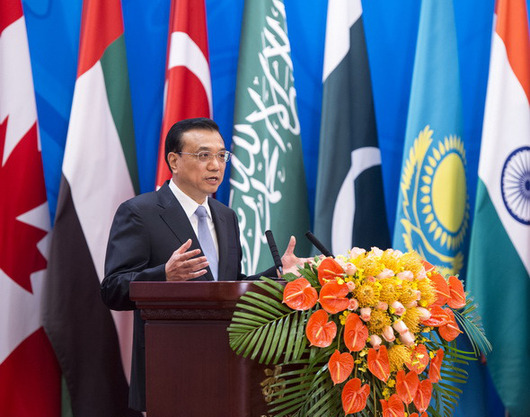Promoting security and prosperity of Afghanistan and the region
- By Li Keqiang
 0 Comment(s)
0 Comment(s) Print
Print E-mail China.org.cn, November 4, 2014
E-mail China.org.cn, November 4, 2014
|
|
|
Chinese Premier Li Keqiang addresses the opening ceremony of the fourth ministerial conference of the Istanbul Process on Afghanistan in Beijing on October 31, 2014. [Photo by Wang Ye] |
Since its inception in 2011, the Istanbul Process has become a unique regional cooperation mechanism on Afghanistan, providing an important platform for countries in the region and the wider international community to enhance communication, understanding, coordination and cooperation on Afghanistan. Continued progress of the Istanbul Process will help bring about an early solution to the Afghan issue and the ultimate attainment of durable peace, stability, and economic and social development in the region.
The fourth Ministerial Conference is the first important international conference on Afghanistan since the elections in Afghanistan. We hope that this conference will send a clear signal that the countries in the region, and the rest of the international community, offer their strong support to ensure a smooth transition, establish security and development in Afghanistan, and they reiterate their long-standing commitment to peace and reconstruction there, and demonstrate their full confidence in the future of the country.
Afghanistan is in an important geographical position as it connects South Asia, Central Asia and West Asia, bordering China to the east. A shining pearl on the ancient Silk Road, Afghanistan was where civilizations met and numerous kingdoms left their mark on history. More than 2,100 years ago, Zhang Qian, an envoy of China's Western Han Dynasty (206 BC - AD), recorded an Afghanistan bustling with travelling merchants and trade caravans. The Gandharan art that once flourished in Afghanistan and Pakistan is known across the world and had great influence on the murals and sculptures in ancient China.
The Afghan issue has been a regional and international hotspot issue since the end of the 1970s. The international community deeply sympathizes with the Afghan people who have suffered from turmoil and war over the past 30 years and more. Afghanistan is now at a crucial stage of political, security and economic transition. The Afghan people now have a new opportunity to realize unity, stability, peace, reconstruction and development. However, the task remains formidable and daunting.






